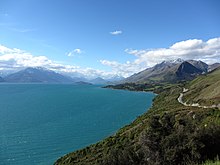| Mnesarchaea paracosma | |
|---|---|

| |
| Scientific classification | |
| Domain: | Eukaryota |
| Kingdom: | Animalia |
| Phylum: | Arthropoda |
| Class: | Insecta |
| Order: | Lepidoptera |
| Family: | Mnesarchaeidae |
| Genus: | Mnesarchaea |
| Species: | M. paracosma |
| Binomial name | |
| Mnesarchaea paracosma Meyrick, 1885 | |
Mnesarchaea paracosma is a species of primitive moths in the family Mnesarchaeidae. It is endemic to New Zealand and can be found in the Kaikōura, mid and south Canterbury, MacKenzie, Otago Lakes, Central Otago, Dunedin, Fiordland and Southland areas. M. paracosma lives in a wide variety of habitats including tussock grasslands, shrubland, and damp native beech or podocarp forests, at a range of altitudes from around sea-level up to 1200 m. Adults of this species are on the wing from October to February and are day flying, although they are attracted to light at night.
Taxonomy
This species was first described by Edward Meyrick in 1885. The male lectotype specimen, collected by Meyrick at Lake Wakatipu on the 15 December 1882, is held at the Natural History Museum, London.
Description


Meyrick described the species as follows:
Forewings yellowish-ochreous, with a wedge-shaped whitish streak from middle of costa, and some irregular dark fuscous suffusions.
Hudson went on to give a more detailed description in his 1928 publication The butterflies and moths of New Zealand. He described the species as follows:
The expansion of the wings is considerably under 3⁄8 in. The forewings are elliptical, pale ochreous-golden with two whitish transverse bands; the first at 1⁄2 strongly oblique almost reaching the tornus, the second at 3⁄4 nearly straight; there are a few faint brownish scales on the costa near the base and on the fold; a conspicuous patch of darker scales in the disc before the middle; several irregular elongate patches near the outer edge of the first transverse band and a very dense patch of brownish scales on the apical area; the cilia are golden-ochreous mixed with brownish scales near the apex. The hind-wings are grey with strong golden-purplish reflections; the cilia are brown-ochreous on the costa and grey on the termen.
This species is small and coloured ochreous-brown, with brown, white and yellow patches over its forewings. The antennae of M. paracosma are pale ochreous-yellow. The male of this species has unusually shaped genitalia that assists with the identification of this species.
Distribution
This species is endemic to New Zealand and can be found in the Kaikōura, mid and south Canterbury, MacKenzie, Otago Lakes, Central Otago, Dunedin, Fiordland and Southland areas.
Habitat
M. paracosma lives in a wide variety of habitats including tussock grasslands, shrubland, and damp native beech or podocarp forests but are likely to be found near watercourses or moist areas as a result of their larvae existing on periphyton. The species exists at a range of altitudes from around sea-level up to 1200 m.
Behaviour
Adults of this species are on the wing from October to February. Although this moth is normally day flying it is also attracted to light and has been collected via night light trapping.
Host species
The larvae of M. paracosma require moist periphyton and are believed to feed on a variety of fungi, algae, mosses, liverworts and fern sporangia.
References
- ^ "Mnesarchaea paracosma Meyrick, 1885". www.nzor.org.nz. 2021. Retrieved 2021-08-23.
- ^ Edward Meyrick (November 1885). "Descriptions of New Zealand Microlepidoptera. Gelechiadae. VIII. Tineina (part)". New Zealand Journal of Science. 2 (12): 591. Wikidata Q108097450.
- Dugdale , J. S. (23 September 1988). "Lepidoptera - annotated catalogue, and keys to family-group taxa". Fauna of New Zealand. 14. Department of Scientific and Industrial Research: 55. doi:10.7931/J2/FNZ.14. ISSN 0111-5383. Wikidata Q45083134.
- ^ Hudson, G. V. (1928), The butterflies and moths of New Zealand, Illustrator: George Hudson, Wellington: Ferguson and Osborn Limited, p. 366, LCCN 88133764, OCLC 25449322, Wikidata Q58593286
- ^ Gibbs, George W.; Kristensen, Niels P. (28 May 2019). "Mnesarchaeidae (Insecta: Lepidoptera: Hepialoidea)" (PDF). Fauna of New Zealand (in English and Māori). 78. Lincoln: Manaaki Whenua – Landcare Research: 44–45. doi:10.7931/J2/FNZ.78. ISSN 0111-5383. Wikidata Q104802925. Archived from the original (PDF) on 19 February 2021.
- Alfred Philpott (1927). "The Genitalia of the Mnesarchaeidae". Transactions and Proceedings of the New Zealand Institute. 57: 712. ISSN 1176-6158. Wikidata Q108225849.
- "Mnesarchaea paracosma Meyrick, 1885". nztcs.org.nz. 2021. Retrieved 2021-08-23.
| Taxon identifiers | |
|---|---|
| Mnesarchaea paracosma | |